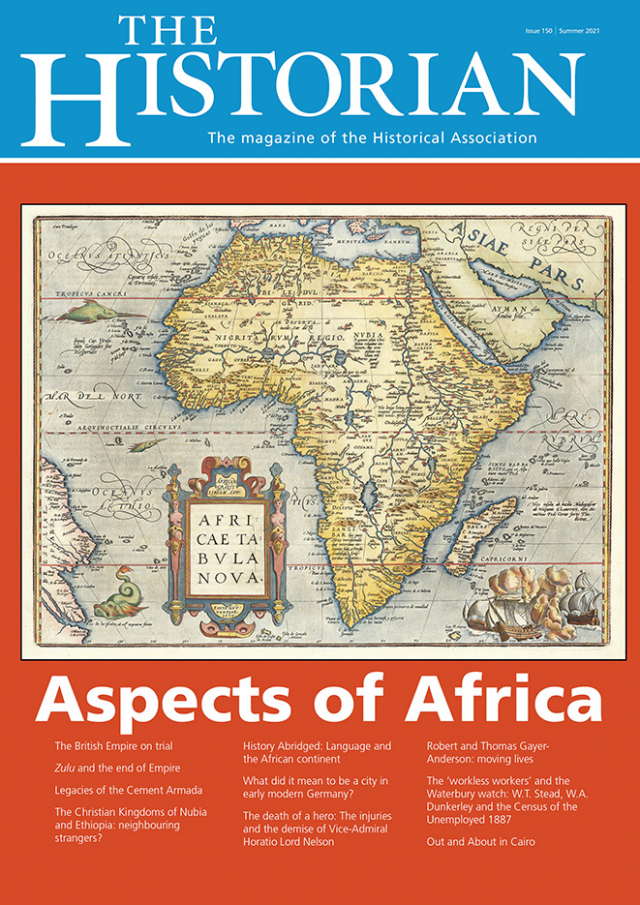The Historian 150: Out now
The magazine of the Historical Association

Editorial: Aspects of Africa
Read The Historian 150: Aspects of Africa
The Editorial Board for The Historian meets about four times a year, in particular to plan themes for future journals up to two years in advance. Choices need to be made to reflect different periods of time, world-wide locations, and diverse interests. They are influenced by up-coming anniversaries of significant events, present-day current affairs and feedback from readers. Occasionally members of the Board put forward an interest of their own.
The purpose of the theme is to give some coherence to each edition, but it has meant that, in the past, many of the articles offered for publication could not be included because they did not ‘fit’. To remedy this, three of the seven or so main features are now allocated to random topics. Guidelines for authors are available on the website.
Most of our themes have broad parameters, but perhaps sometimes they are just too broad. It was brought home to me as soon as I began commissioning articles for this ‘Aspects of Africa’ edition, what an insult the idea is of dedicating just one journal, and within that just four features, to African history. At present, historians are rightly re-evaluating the impact and legacy on Africa of the slave trade and our colonial past. In Egypt and along the Mediterranean, the archaeological excavations continue to develop our understanding of those people and their lives. But it is a vast continent, with many different ethnicities, cultures and languages, and a past dating back to the very origins of man. The subjects included in this edition cannot even begin to scratch the surface of such a rich and fascinating history.
Given the impact and long-term consequences of the ‘Scramble for Africa’, it would have been wrong to ignore that period of European domination. Dr Gregory Gifford presents a balanced view of the debate about the relative harm and advantage brought by British Imperial rule throughout the world, weighing up the evidence as might be done in a courtroom.
The end of empire had to come, but most of the outcomes have not been beneficial for the African people. Steven Pierce considers the reporting of and enquiries into the ‘cement armada’, which took place in Nigeria in 1974/5, some details of which read like a farcical scene from a spoof spy story. In fact, Pierce’s examination of the facts reveals that the corruption that emerged from the British system of under-funded ‘indirect rule’ seriously increased following the incident, and now dominates the world’s perception of Nigeria.
About a century before Nigeria’s ‘cement armada’, Britain was engaged in the Anglo-Zulu war. Nicholas Kinloch looks at what the very successful film, Zulu, can tell us about Anglo-Zulu relations, the Battle of Rorke’s Drift and Britain in 1964, when the film was made. He explains that, despite the many inaccuracies in the portrayal of the battle, much is revealed by this interpretation.
Going back several centuries further into the past, Adam Simmons reviews research on Christian Ethiopia and Nubia in the medieval period. He summarises what is known of the thought-provoking relationship between these two neighbouring societies but recognises how much more there is to learn and how sparse relevant sources are at present.
Moving away from Africa and areas of British imperial influence, Alex Collins examines the significance of cities in the much earlier Holy Roman Empire. He questions whether Machiavelli’s description of those cities reflected reality and to what extent the cities were independent from, yet crucial to, the economy and survival of the Empire.
Uncommonly for writers for The Historian, Michael Crumplin is a retired consultant surgeon, and this gives him an unusual perspective on the death of Admiral Lord Nelson. Crumplin describes Nelson’s medical history and the events leading to the fatal wound at the Battle of Trafalgar in compelling detail and, using his medical expertise, is able to provide a convincing explanation for the tragedy. In the final feature, Peter Hounsell shares his fascinating research into the connection, in the 1880s, between the Queen’s Golden Jubilee, the Waterbury Watch Company and London’s unemployed.
We have previously asked for applicants to join The Historian Editorial Board and it is not too late to offer your time and expertise. It is a voluntary role, not too onerous, but does require attendance at quarterly meetings and a willingness to take responsibility for around one edition of The Historian a year. This involves commissioning writers for our themed features, so it is useful, but not essential, to have contacts with potential authors. Aspiring new members of the Board will be asked to write a short piece and to commission an article for an up-coming edition. For more information, contact the Historical Association at: thehistorian@history.org.uk

